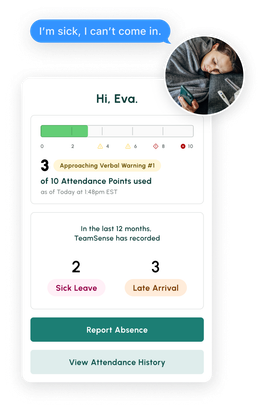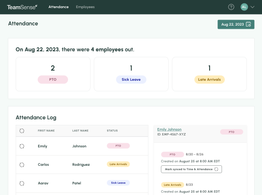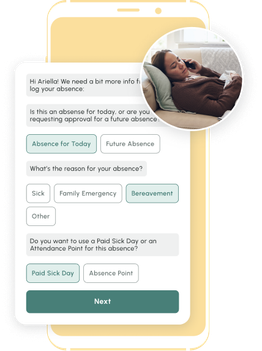Fix the root cause of No-Call No-Show with help from TeamSense
Table of Contents
- Why Is Mental Health in the Workplace Important?
- How Does Mental Health Impact Work?
- 10 Ways to Support Employee Mental Health in the Workplace
- 1. Craft Time Off Policies That Support Work-Life Balance
- 2. Address Excessive Absences
- 3. Be Vulnerable, Communicate Openly, and Offer Support
- 4. Prevent Burnout
- 5. Model Healthy Behavior to Employees
- 6. Offer Counseling and Wellness Program Benefits
- 8. Remind Your Team of The Mental Health Benefits They Have
- 9. Flexibility
- 10. Check in Often
- Causes of Mental Illness in the Workplace
- The Role of Mental Health and Productivity in the Workplace
- Make Mental Health in the Workplace Part of Your Culture
Mental health is a hot-button topic on everyone’s minds these days—including companies. What was already an issue under the surface got exposed even more thanks to the pandemic shining a light on mental health in the workplace. Across the board, more employees are being honest about their mental health struggles—more than 31% of full-time workers surveyed say their own mental health has gone down in the last year.1
The good news? More companies are taking note of the importance of mental health in the workplace, with 92% of benefit leaders saying that supporting employee mental health became a high priority for their company in the last year.2But how do you support employee mental health while keeping your company operations running smoothly? It’s a relevant question that many companies are starting to ask in a post-pandemic world. Here are 10 ways to support employee mental health in the workplace.
Why Is Mental Health in the Workplace Important?
First of all, mental health, in general, is extremely important and something that should be prioritized. And considering that the average employee spends ⅓ of their life working, it’s safe to say that your mental health does have some kind of impact on your work.
Your employees bring their whole selves to work each day, and what goes on in their lives outside your company walls can affect them while they’re inside your walls. An argument with a spouse, a sick child, financial issues—all of these can take a toll on an employee’s mental health and negatively impact their judgment, attitude, and actions while at work.
Everyone at your company should be aware of the importance of mental health in the workplace. Human Resource teams can’t bear that burden alone either. Improving mental health in the workplace is something everyone can have a hand in.
How Does Mental Health Impact Work?
Employees who are distracted by mental health concerns can not only become unproductive, but can also contribute to safety issues and injury, among other things. Here’s the big picture look at how mental health impacts work:
Retention
Employees with access to mental health benefits may be less likely to leave your company. Just like comparing pay, schedules, and health benefits, an employee who’s happy with the mental health benefits they’re receiving in the workplace might stick around longer. In fact, 59% of employees say they would stay at a job because of their quality mental health benefits.3
Absenteeism
Like physical health, employee mental health is a big factor affecting how often employees are absent. Employees who experience higher levels of anxiety, depression, or other mental health concerns may find it challenging to come to work as scheduled—leading to higher absenteeism rates.
Just as you would expect an employee with a physical illness or injury to take a sick day, your employees with mental health issues may also need some time away from work to get help and cope with the pressures of work and life in general.
Productivity
When your team members are well adjusted and feeling their best, they can focus on their work with less distractions. Employees who feel supported by what they see when it comes to mental health in the workplace can be more focused on their work.
Return on Investment
It’s no secret incorporating certain mental health benefits may cost your company money, but it’s important to remember this is a worthwhile investment. Taking an interest in your team’s mental health in the workplace can result in more employees hitting goals, increasing profit, and choosing to remain with your company. All of that equals a solid return on investment for you.
If you or another member on your team is struggling with mental health affecting work performance, know that there are plenty of ways to work through it. Sometimes the hardest part is taking note of the issue and realizing that where you’re at with your mental health is affecting work.

10 Ways to Support Employee Mental Health in the Workplace
When you recognize the importance of employee mental health and have clear attendance policies and practices, you can manage absenteeism and support your employees at the same time. Take the following steps to gain better control over absenteeism and promote employee mental health in the workplace.
1. Craft Time Off Policies That Support Work-Life Balance
You might think illness and injuries are the only reasons an employee would call in sick. And that might be true at some companies. But you can change that.
Since both physical and mental wellness are equally important, make it okay for employees to use sick days to take care of their mental health. You could even offer personal days that employees can use for any reason—that way, they don’t have to burn sick days or vacation days. Just be sure you cover all the specifics in your attendance policy, that way, there’s no confusion.
Whether you offer sick days, personal days, or even specific “mental health days,” remember that there are legal limits to which questions you can ask employees when they are absent.
2. Address Excessive Absences
While some employees might rarely take a sick day to focus on their mental health, others might struggle with the opposite problem—they’re continually absent and missing work.
To make sure you’re aware of all issues related to excessive time off, you’ll need an attendance management solution that provides visibility into employee absences and reporting to help you see trends over time. With access to tools that provide a real-time view of which employees have the most unplanned absences, you can take appropriate steps to address problems before they get worse.
3. Be Vulnerable, Communicate Openly, and Offer Support
Nothing is worse than feeling alone when you’re already struggling. That’s why it’s important to be a sounding board for your employees. Keeping open lines of communication will help your team feel like they can express their struggles—like the conflict they’re having with a colleague or the issues they’re having securing childcare each day.
Encourage your managers to be vulnerable too. Too often, people like to put on a front that they have it all together—especially if they’re in leadership. But encouraging managers to open up and be more vulnerable with their team can make inroads to improve communication.
4. Prevent Burnout
Another blessing in disguise from the pandemic was the awareness of employee burnout. Companies and employees alike began to realize that showing up to work sick, not taking vacation days, and running yourself into the ground doesn’t work well for longevity (not to mention work performance).
Even though preventing employee burnout requires being intentional, sometimes it doesn’t take much effort at all. It can be as easy as just reassuring a team member that when they go home for the day, they need to “leave work at work” and not check email or prep for the next day’s shift after hours.
Notice someone on your team who hasn’t taken a break in a while? Give them a nudge to remember to take their PTO vacation. And when they're sick, set the precedent that they need to go home, take it easy, and rest instead of pushing through at work.
5. Model Healthy Behavior to Employees
It’s important that those in leadership set the example for other team members to follow. And this includes prioritizing mental health in the workplace. Leadership teams and HR managers should be at the forefront of prioritizing self-care and setting healthy boundaries. So, if you’re going to tell your direct reports to take a day off when they need it, make sure you are doing it too.
6. Offer Counseling and Wellness Program Benefits
Employees absent from work due to mental health issues can benefit from assistance and resources to help them cope. And get this, 91% of employees believe a company’s culture should support mental health.4 In other words—almost all employees.
With workers expecting that, it can feel pretty daunting to live up to. But the good news is, small steps like offering counseling reimbursements and free access to mental health and fitness apps can go a long way. Think through ways your company can work to include wellness initiatives like these as part of your benefits package.

7. Normalize Talking About Mental Health
Even though there have been great strides in normalizing talking about mental health since 2020—there’s still work to be done. Unfortunately, talking about mental health in the workplace can still have a stigma surrounding it.
Even though you can’t change people’s minds, you can change the way your company views and talks about mental health in the workplace. And that starts with the little things too—like making it completely normal for someone to take a “mental health day.”
8. Remind Your Team of The Mental Health Benefits They Have
Even if you think your company is doing all the right things and offering all the right benefits, that doesn’t mean your team is going to take you up on those benefits. Remember, just because you offer 20 covered therapy sessions a year, doesn’t mean Frank from shipping is going to go.
Obviously, you can’t make employees take advantage of the mental health benefits you offer, but you can continually talk about how proud the company is to provide these essential mental health benefits. The last thing you want is for someone who wished to help never to have known mental health benefits were even offered. Ouch. So makes these benefits known and easy to access.
9. Flexibility
Offer a flex schedule (if your work allows for it). For some companies, that might mean adapting hybrid or remote work options. But not every industry lends itself to that type of working environment—especially when it comes to hourly employees.
Another flexible option to consider is “flex time,” where your attendance policy lets employees who come in after their start time simply stay later to make up the time. Again, this idea might only work for certain companies and industries.
10. Check in Often
Asking your team how they’re doing never gets old. Sometimes just feeling seen can go a long way. When was the last time you told someone that you appreciated their work? Not on their work anniversary. Not when they got noticed by the boss for it. Just on a regular Tuesday afternoon. Employees who feel recognized for their contribution to your company may be more interested in sticking around too.
And remember, If an employee has confided in you that they’re struggling, make it a point to continue to follow up on them. Check in every now and again about how their progress is going.

Save Hundreds of Hours A Year With TeamSense
See how TeamSense saved HelloFresh 3-4 hours per day managing attendance through text. Read the case study and book your demo today!
Causes of Mental Illness in the Workplace
It’s easy to think that mental illness in the workplace is only caused by something extreme happening—like being fired. In truth, there are plenty of little reasons that can stack up over time—not just a single one-off moment of high emotion.
When we think about the causes of mental illness in the workplace, it’s important to keep in mind that not all of these factors can lead an employee to struggle with their mental health. On the flip side, just one of these reasons might cause severe mental health issues for another employee.
Here are a few causes of mental illness in the workplace:
Conflict with Peers or Management
Home Life Stress
Increased Workload
Job Insecurity
Long Hours
Burnout
Work Pressure
Lack of Support
Lack of Appreciation
Contribution Unnoticed
Financial Concerns
The Role of Mental Health and Productivity in the Workplace
Mental health concerns are more common than you might think. According to a Mental Health America study, nearly one in five Americans reported experiencing a mental illness before the pandemic.5 The same study also found that since the pandemic, there has been a sharp rise in people reporting mental health concerns such as depression, anxiety, and suicidal thoughts.
Though employee mental health is important in any workplace, it is especially relevant for hourly employees. Hourly employees don’t have the option of working remotely. As a result, they may experience higher levels of stress and the need to stay home for a “mental health day.” But the stigma associated with mental illness in some environments can make employees less likely to get help for their mental health issues. Instead, they may experience absenteeism and “presenteeism” (they are physically in the building but not as focused on their work as they should be).
So is it true that the state of an employee’s mental health affects their work? Absolutely. Mental health and productivity in the workplace go hand-in-hand when it comes to an employee’s attitude and abilities. If someone on your team is struggling with their mental health, they likely won’t be performing at their best level each day.
Make Mental Health in the Workplace Part of Your Culture
If you're unsure about how mental health affecting work impacts your organization, consider sending an anonymous text-based survey that all employees can access without downloading an app or generating a user account. This way, you can gain insightful information to better serve the team, without making them feel like you’ll use the information against them. Anonymity is the key to building trust here.
Once you collect the responses, your company can send back a text to the employee connecting them to available company resources, such as your company’s Employee Assistance Program (EAP) and medical benefits plan. After the survey results are in, you can review the employee answers to gain insights and understanding. Once you know the pressure points of mental health and productivity in the workplace, you can work on possible solutions to address them. It’s a small step in the right direction to improve mental health in the workplace.

No one wants to talk to their boss or a 1-800 stranger to call off. Text changes everything - Reducing No Call No Shows.
About the Author

Sheila Stafford, CEO | Leader in Applied AI for Frontline Productivity
As CEO of TeamSense, Sheila Stafford is at the forefront of increasing productivity for frontline teams through AI-driven solutions. Her visionary approach combines cutting-edge technology with a thoughtful focus on enhancing human connection; Sheila strategically implements AI where it adds the most value while recognizing the critical role of personal interaction and ensuring that human engagement remains central when it matters most. Under her leadership, TeamSense is redefining how companies support and engage their frontline teams for a more connected, efficient workplace.





